Local SEO for Small Business 2025 Success Guide
Local visibility is important for any small business looking to survive in their industry or community. This local SEO for small businesses ultimate guide helps equip your business with essential strategies and insights to help navigate the local search landscape.
This guide helps empower business owners to attract more local customers, boost brand awareness, and achieve local wins and success. Let’s get started and dive into local SEO for small businesses!
What is Local SEO?
Local SEO is a search engine optimization strategy that focuses on increasing rankings, traffic, and conversions for a local business. A heavy focus is placed on targeting location-specific keywords, Google My Business optimization, increasing Local Map Pack rankings, and generating a stronger local brand presence.
Local SEO and traditional SEO are different mostly due to the ranking factors each one prioritizes. Local SEO ranking factors are strongly influenced by online reviews, geo-location keywords, and Google Business Profile.
Traditional SEO focuses more on quality content, backlinks, and technical SEO.
Jump down to see a breakdown of the local SEO ranking factors!
Local SEO vs Small Business SEO: What’s the Difference?
Local SEO is a search optimization strategy that focuses on helping local businesses increase their online rankings, organic traffic, and organic conversions. It applies to any sized business as long as it’s local — small or enterprise.
Small Business SEO is a specific focus of search engine optimization for small businesses regardless of whether it’s a local or national brand.
When the two are combined, you get local SEO for small businesses. The result is a hyper-focused SEO strategy that targets local small businesses — a market that hasn’t been given the attention it deserves.
SEO used to be considered something meant for enterprise businesses, unattainable to companies with a small footprint and budget.
Boostability small business SEO services make SEO accessible to everyone, small business owners included! This ultimate guide is meant for businesses like yours.
Keep reading for expert local SEO strategies, tips, tools, and more to give your business a leg up against your online and local competitors!
Have questions? Talk to an SEO pro.
Why is Local SEO for Small Business Important?
For businesses that have a local audience who can either visit a physical location or a website, local SEO is vital to growing your business, increasing foot traffic into your store, and remaining relevant.
Depending on the local industry’s competition, local SEO can generate faster results compared to traditional search engine optimization for more generalized terms. Results prove to show:
• 40% of local SEO campaigns generated an ROI of 500% or more.
• 82% of people use their phones to conduct “near me” searches.
• 46% of Google searches are for a local business or local service.
• “Near me” mobile searches increased by 136% last year.
With the increased use of smartphones and advanced voice search capabilities, people are changing the way they are searching for answers or looking for new products and services. And search engines are changing the way they are delivering those results.
Local SEO is no longer something that can be placed on the back burner if businesses want to succeed in their local markets. With 97% of users searching online to find a local business, the demand is quickly growing, and businesses need to take advantage of these trends to gain as much exposure with their local audience as possible.
Local SEO for Small Business: Where Can You Rank?
Local SEO for small businesses creates an opportunity to be featured in more than one location on search engine result pages (SERPs). On Google specifically, there is the local organic SERP and the Local Map Pack.
Local Organic SERP
This is the same as traditional SEO, where websites rank on SERPs in spots that are not designated for advertisements or featured snippets. Organic listings typically fall underneath advertisements and featured snippets.
An advertisement listing will show “Ad” in the copy, so you’ll know the difference between an organic listing versus an advertisement.
Featured snippets are often displayed in various forms, including People Also Ask questions and answer boxes at the top of the SERP, and they all have their own vital roles to play in a successful SEO campaign.
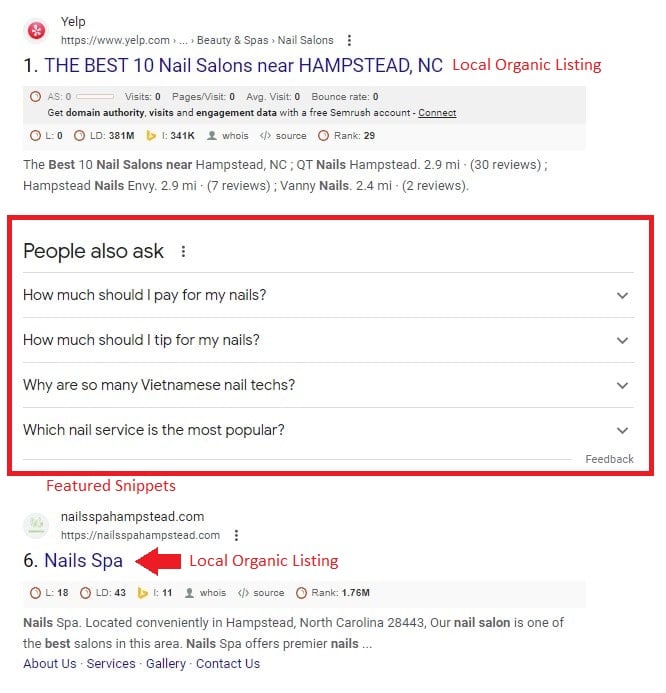
Local Map Pack
The Local Map Pack displays the Google My Business listings (now known as Google Business Profile) at either the top of the SERP or to the right of the screen. There are typically three listings displayed at a time (also referred to as the Local 3-Pack).
There will be a button that can be clicked to ‘View All’ businesses in close proximity that can fulfill the search query.
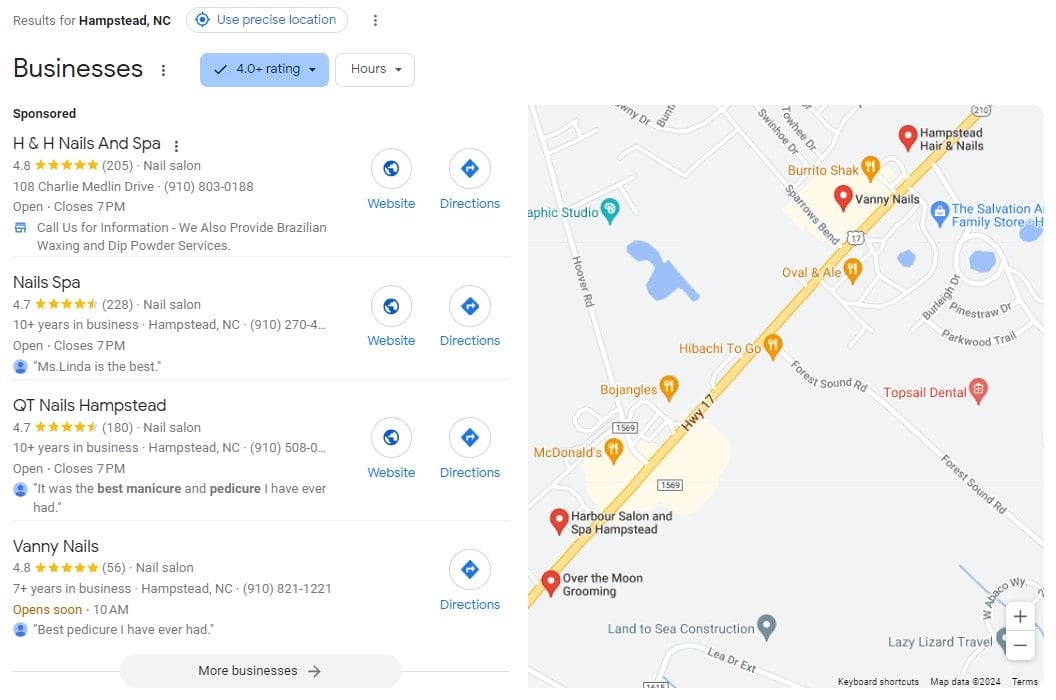
Have questions? Talk to an SEO pro.
What are the Benefits of Local SEO for Small Businesses?
1. Increase Brand Awareness in Your Local Community
Local search results are more valuable to small businesses now than ever! Choosing the best keywords to be placed within the website content can help the business show up in front of its targeted customers. That means people who are searching for services and products to purchase.
More individuals nowadays have switched to searching for products and services online before going out and getting them or even purchasing them online. When a small business implements local SEO strategies to help customers find what they’re looking for, it can be the first one in line to help them. Even with a local perspective, it adds another layer of value and trust to invest in your business.
2. Higher Rankings Result in Higher Conversions
Local SEO for small businesses is a great way to get in front of people who are looking for a product or service now. 97% of search engine users searched online to find a local business, and 50% of local searches resulted in a store visit within a day.
Optimizing businesses for local search can help increase rankings to get products and services in front of people who are looking to make a purchase now. When individuals search online, they tend to look for the easiest and most recent answer to their search query.
If your small business isn’t ranking high enough, people will not purchase your products or services.
Note: SEO takes time to generate results, it is not immediate. While there are low-hanging fruit opportunities to go after to see results more quickly, specific time frames depend on various factors.
Those factors include competition levels, website health, algorithm updates, and more. While SEO can take longer to generate results compared to more immediate channels (e.g., paid advertising), it is a more sustainable solution for long-term business growth.
See what factors influence how long SEO takes to work in our in-depth article!
3. Compete Against Local Competitors
As mentioned earlier, local SEO for small businesses is essential to remain relevant and beat local competitors to capture more customers and clients. Most business owners aren’t aware of all the local competitors in their space or what their marketing strategies are.
A local SEO company makes it their business to know what your competitors are doing and what strategies they’re implementing to achieve higher rankings. With that knowledge, we can tailor your local SEO campaign to capture opportunities to outrank them, attract more business, and become the trusted brand for your ICP (ideal customer profile).
4. Increase Local Brand Recognition & Trust
When your business has strong positive social proof from positive customer reviews, high customer retention, and good press, the more trustworthy your brand will be with people AND search engines. This directly leads to more business and conversions for businesses.
Local SEO for small businesses is all about building a brand’s trust and reputation online, which is crucial in today’s digital landscape. When people search for businesses online, they want to feel confident that the websites they land on are trustworthy and authoritative.
This is why a strong focus on building Experience, Expertise, Authority, and Trustworthiness (Google E-E-A-T) is essential. From optimizing local listings and creating high-quality content to obtaining positive reviews and building relationships with other reputable businesses in the community.
By implementing these strategies, businesses can establish themselves as experts in their field and build a loyal customer base that trusts and values their products or services.
Additional resources on local SEO for small businesses:
• 5 Common Local Search Rankings Factors
• Why Local Listings Management Still Matters (Video)
• Google My Business Optimization – a Success Guide
What are the Local SEO Ranking Factors?
Local Organic SERP
With traditional SEO, there are over 200 ranking factors. Much of those overlap with local search but it can quickly become overwhelming trying to implement every single tactic. For the local organic SERP, here are the top three ranking factors small businesses can start optimizing their website for:
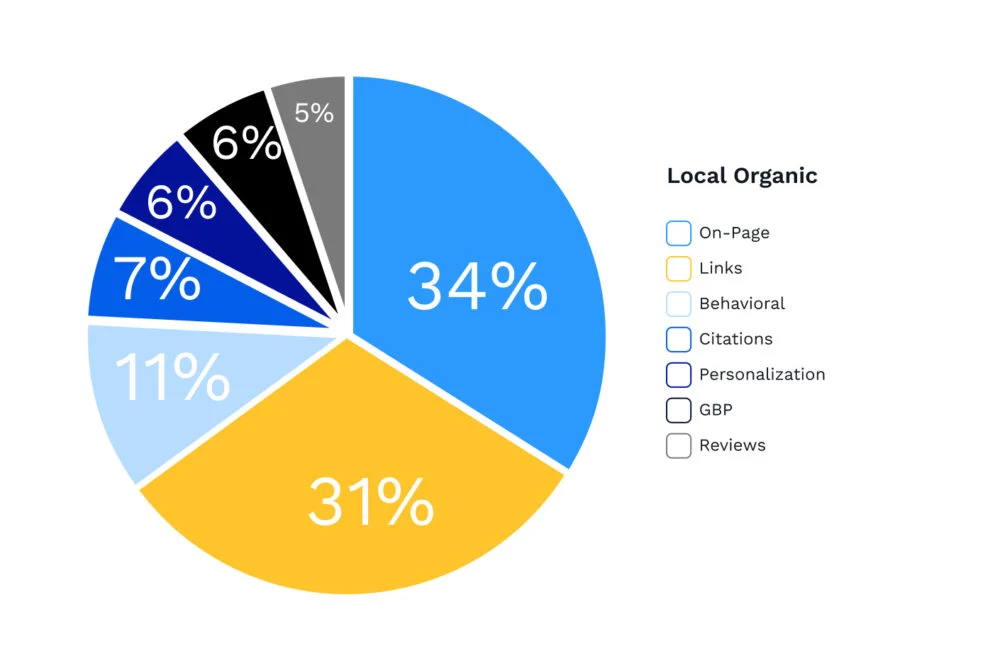
1. On-Page Signals
The most important ranking signal for local organic SERPs is producing high-quality content and on-page SEO. There are a variety of on-page SEO strategies that can be implemented on a website, including placing relevant keywords in content.
Search engines will look for these keywords and see how they’re placed. If they are placed strategically, they can help get your website ranking in specific areas for your industry.
Another factor can be mobile-friendliness and user experience. Having a responsive website that’s accessible, easy to navigate, and fast loading will make things easier for users and will reflect positively on your local SEO strategy.
2. Local Link Building
The second most important ranking factor for local organic search is the number of backlinks your small business has. Building quality, relevant, and natural backlinks is an essential part of any organic local SEO strategy.
While quantity is important, the goal is to focus on the quality of your backlinks. The more trustworthy and authoritative your backlinks are, the better the results are for your local organic rankings. However, this should be an ongoing practice to continue growing the number of backlinks and linking domains.
3. Behavior Signals
As the third most important ranking factor for local organic SERPs, behavior signals are how people are engaging and interacting with your organic listing. There are many behavioral signals, but here are some common ones:
• Clicks
• Click-through-rate
• Mobile clicks-to-call
• Check-ins
Local Map Pack
The local map pack has several different ranking factors, but the top three you should be aware of are:
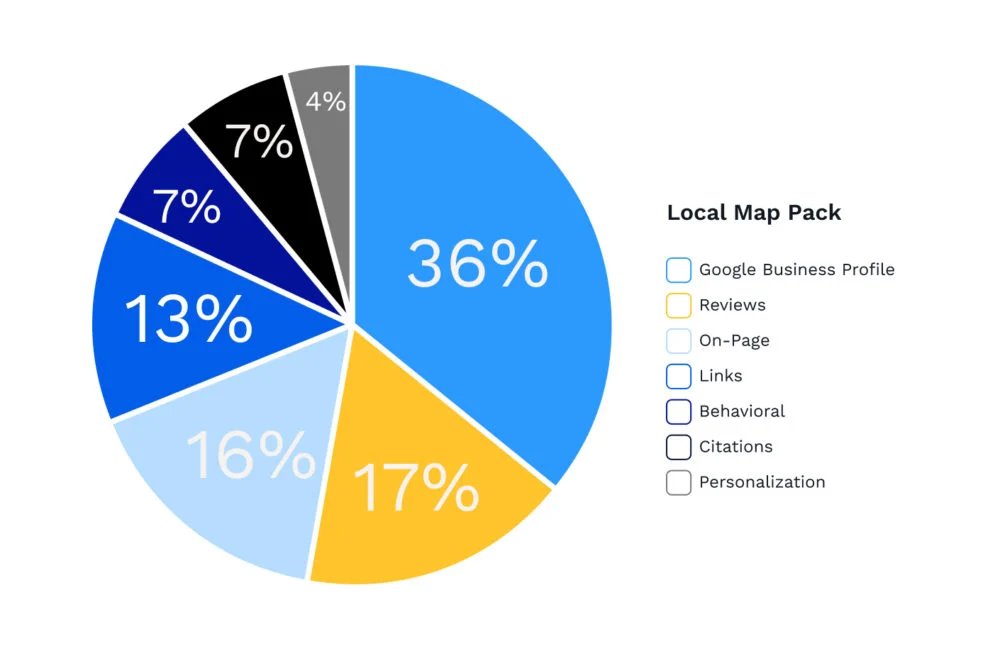
1. Google Business Profile = Proximity, Relevance, and Prominence
Google prioritizes Proximity, Relevance, and Prominence as Local Map Pack ranking factors. All three can be addressed in your Google Business Profile (GBP):
• Proximity means how close a business is compared to where the search was conducted.
• Relevance means how applicable (relevant) the business is compared to the search. The Google Business Profile must accurately reflect what the business is selling.
• Prominence means how well-recognized the business is (more on that in the section section).
Being consistent with your business information and optimizing your GBP are necessary steps to increase your local rankings in the Local Map Pack.
Inaccurate and inconsistent business listings can be seen as spammy and untrustworthy by search engines. As a result, the business can drop off search engine rankings entirely.
2. Online Reviews (Prominence)
The second most important ranking factor for the Local Map Pack is online reviews. Positive online reviews are a direct ranking factor, and the goal should be to get as many 4 and 5-star reviews as possible.
The more positive reviews a small business has, the higher the rankings are. This applies to other business listings and areas where online reviews can be collected, not just Google Business Profile.
However, negative reviews are bound to appear every once in a while. Unless they are fake reviews, it’s not recommended to remove the negative reviews. Treat it as an opportunity to resolve the negative experience instead.
It can actually help build trust with search engines and people when businesses demonstrate their active pursuit of remedying a negative customer experience.
3. Local Citations
Local citations are a critical factor in ranking local businesses within the Local Map Pack. In essence, a citation is a reference to your business name, address, and phone number (NAP) on a website or directory.
Google Business Profile is a free online directory offered by Google, but there are many other online directories that small businesses should be listed in. Accuracy and consistency are crucial for these listings as they enable local search engines to match the information to other sources, build trust in your brand, and generate traffic to your website.
Having correct and consistent business listings also helps to establish a professional image, leading to increased customer confidence. All of these elements work together to improve your local search engine visibility and help customers find your business quickly and easily.
Have questions? Talk to an SEO pro.
Local SEO for Small Businesses: 8 Strategies to Implement Now
With all of the different strategies that go into a quality local search campaign, it’s easy to quickly become overwhelmed and unsure of where to start. But starting now is better than waiting because SEO is a long-term strategy.
Follow these 8 proven strategies to enhance the local SEO for your small business.
1. Make the Website Responsive and Mobile-Friendly
Search engines have moved to mobile-first indexing, meaning that the mobile version of a website will be crawled and indexed first regardless of how well the user experience is on a desktop. This applies even if most website traffic comes from desktops instead of mobile devices.
To succeed online, your website must be mobile-friendly across all devices, not just desktops.
Your small business can do this by making it happen in a few different ways:
• Responsive Website Design: Utilize responsive design principles or consider website builders or content management systems (CMS) with built-in responsiveness features.
• Mobile Testing: Thoroughly test your website on various mobile devices and screen sizes to identify and address any potential layout, functionality, or usability issues.
• Optimize Images and Content: Ensure images are optimized for faster loading on mobile networks, and consider adjusting content length and formatting for better readability on smaller screens.
By prioritizing a responsive and mobile-friendly website, you not only enhance user experience and accessibility but also strengthen your local SEO foundation. This can help pave the way for increased local visibility, engagement, and success in the competitive 2024 local search landscape.
2. Identify Target Location-Based Keywords
Keywords are the backbone of local SEO, bridging your business and potential customers searching for your offerings online. Always check keyword intent and select the keywords that match your business offerings the closest. Relevancy is key here.
You can do this by searching the term yourself in incognito mode and inspecting each ranking organic result on the first SERP, or use tools like Semrush to show the intent of the keyword. This will give you a better understanding of what Google rewards and displays for that specific term.
You can also find location-based keywords from local keyword research tools. You can use free or paid keyword research tools like Google Keyword Planner, Moz, or Semrush. These tools can help you discover relevant keywords with specific search volume data about your location.
They can also help you analyze competitors in your area to see what keywords they use to help gain insights into their strategy and identify potential opportunities.
Another option is to consider the natural language your target audience uses when searching for your products or services locally.
Think of phrases like “best [service] in [location]”, “[product type] near me,” or “[service] + [neighborhood name].”
This can help you discover long-tail local keywords as well. These keywords typically have lower competition but can attract highly qualified leads with clear purchase intent.
3. Optimize Meta Titles and Descriptions for Local Keywords
Meta titles and descriptions are also called metadata or meta information. This is how Google displays a webpage in the SERP:
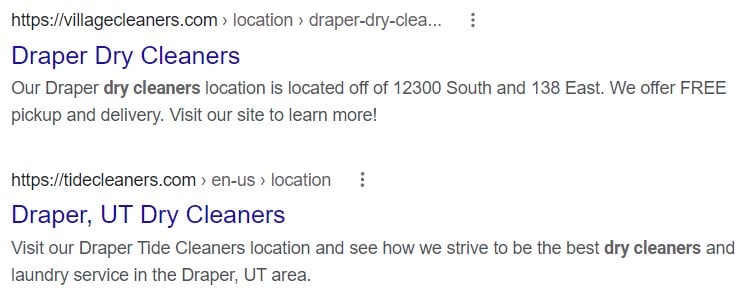
When optimizing the meta title and description for local SEO, use localized and “near me” search terms. The meta title holds a lot of weight in keyword placement value, so ensure that one is in there.
Check back on your meta information occasionally and keep track of any keyword positioning or traffic changes that can result after a change like this.
4. Create Pages Targeting Local Keywords
These can be service pages with the location tagged at the end (for example, “dry cleaning in Salt Lake City”), or they can be location pages that include details on how people can find the physical location. Include NAP information (name, address, and phone number) and additional helpful information, like directions and images of the building’s interior and exterior, so people know what to expect.
If there is more than one location, create different pages highlighting unique features for each one to help search engines determine which storefront is the better option for various geo-targeted search queries. This can include writing about geographical landmarks near the business, providing detailed directions on how to get there, and embedding a Google Map or Apple Map onto the page directly.
And while you’re creating new content for the website, don’t forget to optimize it for voice search! 20% of all Google searches are now conducted on mobile devices through voice search. An easy way to do this is to incorporate questions into the headers of the content to gain visibility and signal high importance to search engines.
5. Create a Google Business Profile and Additional Directory Listings
Having a Google Business Profile listing is almost as important as having a website for a small business. You can search for your business on Google Business Profile and claim your listing if it exists. If not, create a new profile and follow the verification process to confirm ownership.
Be sure to add updated and relevant information to the listing for individuals to find and refer to. You can showcase your business, products, or services with visually appealing photos and videos.
Additionally, other directories are just as valuable. Research and identify local directories relevant to your industry and target audience. Examples include Yelp, Bing Places, Yahoo Local, and industry-specific directories. Some directories may even be more valuable for specific verticals than a Google Business Profile (like Avvo for attorneys).
Getting your clients listed in as many relevant and valuable directories as possible gives their business information even more exposure to prospective customers or clients. Regularly monitor your listings for accuracy and address any inconsistencies or duplicate entries.
6. Ask for Reviews from Satisfied and Happy Customers
Reviews are an ongoing process and a high priority for local search. Quantity and quality matter here, meaning you need to keep generating authentic new reviews. The key here is authenticity. If you find spam or fake reviews, take action against them so they don’t hurt the businesses’ reputation or local search campaign. Learn how to find and remove fake Google reviews here.
Some additional rules to remember include:
• You cannot pay for reviews, but you can ask people to leave one.
• While Google Business Profile is especially important for local search, other directories are beneficial. Ask people to leave reviews on those as well!
• As mentioned earlier, respond and engage with incoming reviews. If negative ones come through, take the opportunity to rectify the situation as best as possible rather than ignoring them.
And don’t forget to thank the people for taking the time to leave a positive response!
Along with generating new, positive reviews, there are a few ways to leverage them. You can display positive reviews prominently on your website to build trust and social proof.
You can also share positive reviews on your social media platforms to reach a wider audience and further enhance your brand reputation. Another way is to utilize positive quotes or excerpts from reviews in marketing materials to showcase customer satisfaction and attract new customers.
7. Ask Local Businesses for a Backlink
Backlinks are an authority signal for search engines and are a highly valued strategy. We will not sugarcoat this—backlinking can be difficult and time-consuming. But when you do it right, it can enrich websites and help increase online visibility for various local keywords.
Here are some tips on where to start with small business clients:
• Partner with local organizations or chambers of commerce to gain backlinks from their websites. These organizations often have high domain authority, making their backlinks particularly valuable.
• Send out local press releases to radio stations and local news websites.
• Do a Google search for the brand to find unlinked mentions and reach out to the page owner for a backlink where the business is mentioned positively.
• Sponsor a charity, event, or scholarship (the contributing organization will typically link to the website). You could also attend local events, participate in community initiatives, or connect with other businesses online.
• Identify businesses in your local area that offer complementary services or products but don’t directly compete with you. This creates a win-win situation where both businesses can benefit from referrals and increased visibility.
8. Use Social Media to Enhance the SEO Campaign
Getting more visibility and traffic to a website or specific web pages is necessary for a successful SEO campaign, and social media is a useful way to do so! Social media agencies have the upper hand by knowing how to target the right audience with valuable content.
The target audience for social media channels is typically the target audience for the business.
Social media platforms also have so many capabilities and features to identify target market opportunities. SEO for social media agencies allows you to help your clients gain even more exposure by getting them in front of their target audience looking to buy a product or service.
The two strategies can work in sync and not independently of one another to generate even more value and growth, resulting in higher client retention. Learn more about how social media helps SEO!
Invest in Local SEO for Small Businesses to Capture More Business and Revenue Growth
There’s a lot that goes into a successful local SEO campaign. SEO is never a one-and-done deal. It constantly evolves and changes to bring users the best results and information relevant to their search query. Reaching countless prospective customers in a local community requires long-term effort and time.
If you’re ready to invest in local SEO for small businesses and see the benefits it can offer your business, learn more about our small business SEO services, and get in touch with an SEO expert to get a quote!
Are you an agency with small business clients in need of support? Boostability’s white label local SEO services will deliver data-driven strategies proven to help increase your local SEO presence. Help your clients drive more qualified traffic and leads to their websites and stores while scaling your business!
Get a Free Quote Today!
Contact us today to receive a free quote for SEO services! Our SEO Technicians will reach out immediately to connect with you on your business goals and information about how we will help you grow online and grow your revenue.
